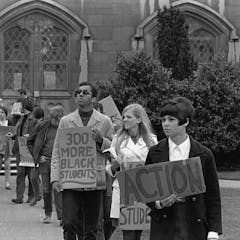
California State University, San Bernardino

California State University, San Bernardino is a preeminent center of intellectual and cultural activity in Inland Southern California. Opened in 1965 and set at the foothills of the beautiful San Bernardino Mountains, the university serves more than 20,000 students each year and graduates about 4,000 students annually.
The “value added” by a CSUSB education ranks in the top 4 percent in the nation, according to the Collegiate Learning Assessment, a sequence of tests used by hundreds of colleges and universities nationwide that measure student learning in the freshman and then in the senior year. First-to-second year retention rates are third highest among all CSU campuses.
CSUSB reflects the dynamic diversity of the region and has the most diverse student population of any university in the Inland Empire, and it has the second highest African American and Hispanic enrollments of all public universities in California. Seventy percent of those who graduate are the first in their families to do so.
Links
Displaying all articles







